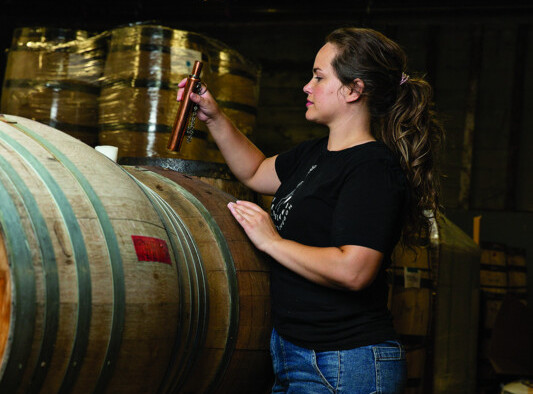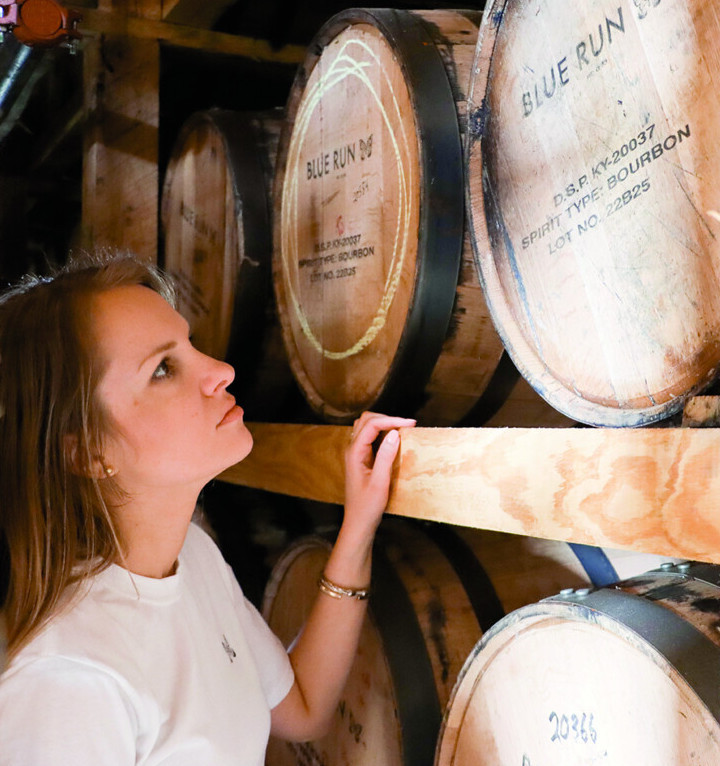
It wasn’t planned this way, but the current graduate-level intern community within the Dewar’s distilling division at Bacardi Ltd. is predominantly women. “It wasn’t a tick-box exercise,” says Dewar’s director of blending Stephanie Macleod. “They just gave us the best presentations and the best account of themselves. It’s really exciting to see how our graduates have developed in their time with us.”
Macleod says the female majority could change with the next class of interns, of course, but it points to the reality that women are increasingly pursuing a career in distilling, a field that until very recently was overwhelmingly made up of men. While men still account for the vast majority of distillers, women are making their marks. According to Women in Distilling, an organization launched by High Point Creative in 2019, fewer than 8% of distilleries are owned and operated by women. The number of active female distillers is likely higher, but the industry has been slow to embrace women on a broad scale. In fact, according to Women in Distilling, the first female master distiller was Marianne Eaves at Castle & Key Distillery, who earned that title in 2015.
Since then, women have become more visible in the industry as both producers and consumers. “The whole proliferation of craft distillers means that people are more aware of what distilling is,” says Bombay Sapphire master distiller Anne Brock. “They have the chance to get experience and to understand the industry a little more, which I think helps attract talent into the industry. We’re certainly starting to see more young women come in.”
Victoria Eady Butler, master blender for Uncle Nearest whiskey, says she’s also seeing change. “The more we talk about the women who are rising in the ranks and finding success for their distilleries, the more representation we’ll have,” she says. “The work never stops and we still have a way to go, but we’re definitely getting there.”

A New Vision
Eady Butler has distilling in her blood, but she wasn’t always viewing the industry as a career. Her great-great-grandfather was Nathan “Nearest” Green, who taught Jack Daniel the craft of distilling whiskey. But Butler spent most of her career in law enforcement. It wasn’t until she was near retirement that she was lured into distilling.
“My grandmother, who is Nearest Green’s granddaughter, made sure that our whole family, and anyone else who would listen, knew that her grandfather taught Jack Daniel how to make whiskey,” Eady Butler says. “And so, I just grew up not putting a whole lot of emphasis on it since she did that for us. It wasn’t until (Uncle Nearest creator) Fawn Weaver came along and unearthed what we now know to be Nearest’s legacy that I really considered giving it a chance. I knew in that moment that if she was going to move forward with creating a whiskey that embodied his spirit, I needed to come out of retirement and be a part of it.”
For Elizabeth McCall, master distiller for Woodford Reserve, distilling wasn’t on the career radar and “the beverage alcohol industry was not in the space that it’s in today” when she emerged from graduate school with a psychology degree in 2009. A chance meeting with a Brown-Forman executive changed her trajectory. He explained that the psychology background was useful in the whiskey-making process, something McCall had never considered before. “It was all very unsexy—I realized Brown-Forman is a really good company and I had student loans to pay and a horse that I need to pay for. It was very practical,” McCall says. “But I learned I had this passion that I didn’t know existed.”
Women in key roles at spirits production facilities were rarities until relatively recently, and those who were making headway may have been under the radar to many outside observers. Alexandra Castle, master distiller and senior vice president for Old Dominick Distillery in Memphis, Tennessee, studied chemical engineering in college but didn’t realize the crossover to distilling. Castle was working at Alltech in the engineering department but also had exposure to the company’s brewing operations and was thrown in head-first when she was invited to observe the new distilling operations. An unexpected absence from her boss meant she was put in charge. “I ran the stills for the first time that day, and I don’t think I stopped smiling once,” Castle says. “That was the day I knew beer wasn’t for me and I needed to be on the distillation side. I ended up running the stills and filling the first hundred or so barrels of what [is now] Town Branch Bourbon.
After a stint at Campari America working on Wild Turkey roughly eight years ago, Castle joined Old Dominick, continuing a career that a dozen years earlier wasn’t on her radar. “There definitely is an increase in the number of women in the industry at my level and at various other levels as well,” she says. “I think social media has something to do with it—the messaging is becoming louder. Maybe there were women doing this before and you just never heard about them, whereas now I think it’s magnified. I know in Tennessee we’ve got three or four different women in the master distiller role and distilleries in Kentucky are starting to increase their numbers as well. We’re also seeing distilleries finally being owned by women. I think we still have a ways to go, but we definitely are gaining momentum in getting that diversity and equity in the industry.”
Castle adds that increasing diversity and equity in these roles simply makes sense. “If you have different backgrounds, you have different experiences, you’re going to bring something to the table and build an even stronger team and stronger industry,” she says.

Making Waves
While numbers are increasing, female distillers are still rare enough that they’re existence raises surprise and, in some cases, a bit of resistance. For example, Molly Troupe, master distiller at Portland’s Freeland Spirits, started her career at Hood River Distilling but was intrigued when she heard about efforts by Jill Kuehler to launch Freeland in the 2010s. The two talked for a couple of years while Kuehler laid the groundwork, Troupe says, then she made the jump to join the nascent company in 2017.
Troupe says she was excited by Kuehler’s tenacity, and she herself was equally ambitious. Her mostly male bosses of previous roles sometimes advised her to “maybe dream a little smaller,” which was upsetting. “I had moments that brought me to tears because, of course, you don’t want to hear that you can’t do something from someone who’s a mentor,” she says. “I have been able to thankfully brush that off and continue to progress in the way that I want to.”

Shaylyn Gammon, whiskey director for Kentucky’s Blue Run Spirits, says some people in the spirits industry are slow to accept change. “Women unjustly face challenges every single day trying to prove our legitimacy in our roles,” she says. “I do think in many ways the specificity and complexity of my role as a scientist keeps some of the opinionated people at arm’s distance. However, all women in this industry have to work around the pre-conceived notions some people have that when we walk into a meeting, the older male is most often considered the most experienced or knowledgeable in the room, and that is not always the case. I’ve experienced this time and time again and know that I owe it to myself and to the other women in this industry—and those who will be in this industry in the future—to continue to insert myself thoughtfully and assertively into the conversation as we all work toward a more balanced playing field.”
Though Macleod hasn’t had any pushback in her career, she says she gets “a lot of surprised faces when I tell people what I do.” But, she adds, “I never felt as if I didn’t belong. If anything, it was probably male colleagues that actually pushed me and introduced me to things like joining committees of the Scotch Whisky Association and our Scotch Whisky Research Institute.”
The expectations of what a distiller should be can run deep. McCall says she suffers from a bit of self-doubt, despite the fact that she is widely supported within the Brown-Forman organization. “Nobody has questioned me being in the role, she says. “It’s an internal imposter syndrome that I definitely fight.” The impact for McCall is that she has difficulty delegating, feeling that she needs to prove—if only to herself—that she is worthy of the title she has earned.
While women are finding their footing, Old Dominick’s Castle points out that women may be uniquely suited for production roles. “A large part of what we do as distillers is sensory-related,” she says. “So you’re smelling distillate and aged whiskey. You’re tasting it. And it’s been proven that women scientifically have a better sense of taste and smell. Of course, that doesn’t mean you can’t train your nose and your palate to get better, but women are just naturally better at it. It makes sense to see more women come into this industry, whether as a distiller or a taster or blender or in some other capacity.”

Expanding The Reach
To build that stronger, more diverse industry, many of the major distillers have formal internships and other outreach programs that emphasize the need to expand access to women and minorities. In many cases, while the programs may have been around for years or even decades, the focus on underrepresented groups is relatively new and part of the company’s diversity, equity, and inclusion strategy. There are also industry efforts such as the StepUp Foundation, a spirits training entrepreneurship program for underrepresented professionals in the spirits industry that was launched by the American Craft Spirits Association.
And finally, simple mentorship efforts are expanding to provide equal access to the field. Macleod, for example, mentors a young Indian woman who showed an interest in Scotch while working at Bacardi India. “She’s left her family and friends behind to pursue this passion for Scotch whisky,” Macleod says, noting that she also mentors other young women as part of her director of blender role.
Freeland Spirits also focuses on mentorship, and earlier this year launched applications for a $10,000 grant to aid women-identifying founders of an alcohol-related food and beverage business in the early stages of development. “There is a shortage of mentorships, and we’re trying to help women along their way,” Troupe says.
These and other efforts are working and will likely accelerate the expansion of women in this male-dominated field. For many, change can’t come soon enough. “It is an industry that has always been slow to change and evolve,” says Castle. “But I am optimistic. I’ve been in it long enough that I do see the change happening slightly faster as time goes on. I’m hoping we’re building momentum so that soon we’ll see bigger, faster changes.”